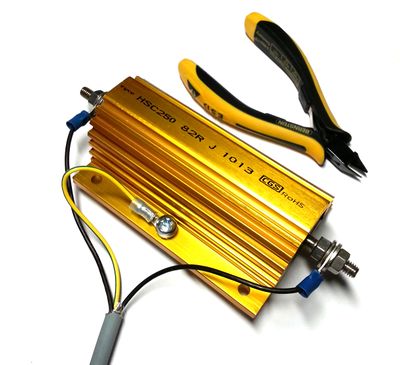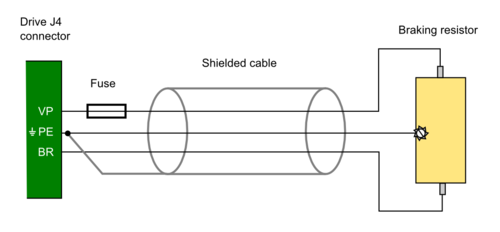Difference between revisions of "Argon user guide/Braking resistor"
| [checked revision] | [checked revision] |
m (moved Argon/Braking resistor to Argon user guide/Braking resistor) |
|||
| Line 26: | Line 26: | ||
{{electricshock|The terminals of the resistors are connected to dangerous voltages. Never touch them before drive power has been [[Power supply safe discharging|safely discharged]].}} | {{electricshock|The terminals of the resistors are connected to dangerous voltages. Never touch them before drive power has been [[Power supply safe discharging|safely discharged]].}} | ||
| − | + | [[Category:Argon user guide]] | |
| − | [[Category:Argon]] | + | |
[[Category:Hardware]] | [[Category:Hardware]] | ||
Revision as of 21:11, 9 August 2013
Regenerative resistors are usually a required part with servo drives to absorb returned energy from decelerating or braking servo axis.
Servo drive with motor can act two ways: energy supply and energy generator. The generator behavior occurs during decelerations and this causes current flow from motor to drive power supply capacitors. If that generated energy is not absorbed anywhere, the voltage of capacitors will rise above overvoltage threshold and trigger an software clearable overvoltage fault.
Argon supports connecting braking resistor directly to drive J4 connector.
Suitable resistor type
Recommended resistor specifications:
- Resistance 80-100 ohms
- Power rating 150-300 Watts
- Wire wound construction (no film resistors)
- Preferrable in metal housing for grounding/noise shielding
The 250W resistor in the image can absorb enough peak energy to stop 100 kg mechanical linear axis moving up to 3 m/s.
Example of suitable resistor: Tyco HSC 250 82R (data sheet pdf).
Installation
The image above shows proper wiring of braking resistor. Proper installation has:
- Shielded cable with 3 conductors with wire gauge at least 0.75 mm² / 18 AWG
- Cable shield AND earth conductor connected to drive PE terminal
- Earth conductor connected to resistor casing. Place toothed locking washers between wire terminal and resistor to break the insulating coating of resistor case.
- Two other conductors connected to resistor terminals through 8A fast blow fuse
- Resistor should be also mounted on heat sink
- Additionally it is a recommended to shield the resistor terminals from accidental touching
| The terminals of the resistors are connected to dangerous voltages. Never touch them before drive power has been safely discharged. |

